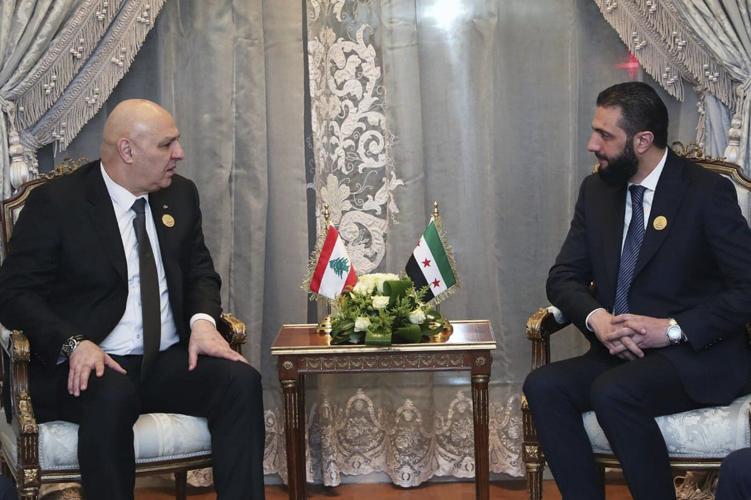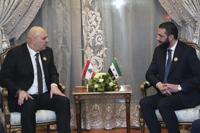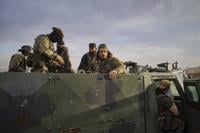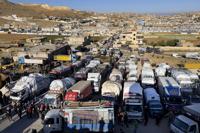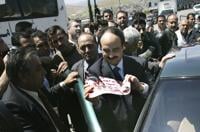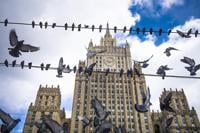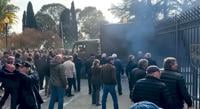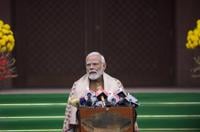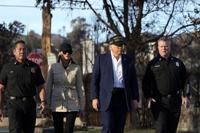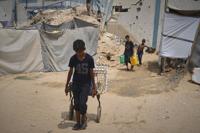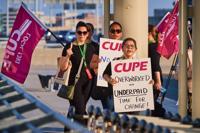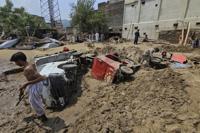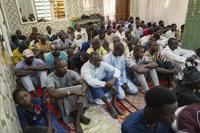BEIRUT (AP) — A lot has happened in just a year on both sides of the Lebanon-Syria border. A lightning offensive by Islamist insurgents in Syria toppled longtime autocrat Bashar Assad and brought a new government in place in Damascus.
In Lebanon, a bruising — the Iran-backed and Assad-allied Shiite Lebanese militant group that had until recently been a powerful force in the Middle East — and a .
Still, even after , relations between Beirut and Damascus remain tense — as they have been for decades past, with Syria long failing to treat its smaller neighbor as a sovereign nation.
Recent have killed and wounded several people, both fighters and civilians, including a four-year-old Lebanese girl. Beirut and Damascus have somewhat coordinated on border security, but attempts to reset political relations have been slow. Despite visits to Syria by two heads of Lebanon's government, no Syrian official has visited Lebanon.
Here is what's behind the complicated relations.
A coldness that goes way back
Many Syrians have resented Hezbollah for wading into Syria's civil war in defense of Assad's government. Assad's fall sent them home, but many Lebanese now fear cross-border attacks by Syria's Islamic militants.
There are new restrictions on Lebanese entering Syria, and Lebanon has maintained tough restrictions on Syrians entering Lebanon.
The Lebanese also fear that Damascus could try to bring Lebanon under a new Syrian tutelage.
Syrians have long seen Lebanon as a staging ground for anti-Syria activities, including hosting opposition figures before Hafez Assad — Bashar Assad's father — ascended to power in a bloodless 1970 coup.
In 1976, Assad senior sent his troops to Lebanon, allegedly to bring peace as Lebanon was hurtling into a civil war that lasted until 1990. Once that ended, Syrian forces — much like a colonial power — remained in Lebanon for another 15 years.
A signature of the Assad family rule, Syria's dreaded security agents disappeared and tortured dissidents to keep the country under their control. They did the same in Lebanon.
“Syrians feel that Lebanon is the main gateway for conspiracies against them,” says Lebanese political analyst Ali Hamadeh.
Turbulent times
It took until 2008 for the two countries to agree to open diplomatic missions, marking Syria's first official recognition of Lebanon as an independent state since it gained independence from France in 1943.
The move came after the 2005 truck-bombing assassination of former Lebanese Prime Minister Rafik Hariri that many blamed on Damascus. Two months later, Syria pulled its troops out of Lebanon under international pressure, ending 29 years of near-complete domination of its neighbor.
When Syria’s own civil war erupted in 2011, hundreds of thousands of Syrians fled across the border, making crisis-hit Lebanon the host of the highest per capita population of refugees in the world. Once in Lebanon, the refugees complained about discrimination, including curfews for Syrian citizens in some areas.
Hezbollah, meanwhile, rushed thousands of its fighters into Syria in 2013 to shore up Assad, worried that its supply lines from Iran could dry up.
And as much as the Lebanese are divided over their country’s internal politics, Syria's war divided them further into those supporting Assad's government and those opposing it.
Distrust and deadlock
A key obstacle to warming relations has been the fate of about 2,000 Syrians in Lebanese prisons, including some 800 held over attacks and shootings, many without trial. Damascus is asking Beirut to hand them over to continue their prison terms in Syria, but Lebanese judicial officials say Beirut won't release any attackers and that each must be studied and resolved separately.
In July, family members of the detainees rallied along a border crossing, demanding their relatives be freed. The protest came amid reports that Syrian troops could deploy foreign fighters in Lebanon, which Damascus officials denied.
Another obstacle is Lebanon’s demand that Syrian refugees go back home now that Assad is gone. About 716,000 Syrian refugees are registered with the U.N. refugee agency, while hundreds of thousands more are unregistered in Lebanon, which has a population of about 5 million.
Syria is also demanding the return of billions of dollars worth of deposits of Syrians trapped in Lebanese banks since Lebanon's historic financial meltdown in 2019.
The worst post-Assad border skirmishes came in mid-March, when Syrian authorities said Hezbollah members crossed the border and kidnapped and killed three Syrian soldiers. The Lebanese government and army said the clash was between smugglers and that Hezbollah wasn't involved.
Days later, Lebanese and Syrian defense ministers flew to Saudi Arabia and and boosting their coordination.
In July, rumors spread in Lebanon, claiming the northern city of Tripoli would be given to Syria in return for Syria giving up the Golan Heights to Israel. And though officials dismissed the rumors, they illustrate the level of distrust between the neighbors.
Beirut was also angered by Syria's appointment this year of a Lebanese army officer — Abdullah Shehadeh, who defected in 2014 from Lebanon to join Syrian insurgents — as the head of security in Syria’s central province of Homs that borders northeastern Lebanon.
In Syria, few were aware of Shehadeh’s real name — he was simply known by his nom de guerre, Abu Youssef the Lebanese. Syrian security officials confirmed the appointment.
What's ahead
Analysts say an important step would be for the two neighbors to work jointly to boost security against cross-border smuggling. A U.S.-backed plan that was recently adopted by the Lebanese government calls for moving toward full demarcation of the border.
Radwan Ziadeh, a senior fellow at the Arab Center in Washington, says the best way forward would be for Syria and Lebanon to address each problem between them individually — not as a package deal.
That way, tensions would be reduced gradually, he said and downplayed recent comments by prominent Syrian anti-Assad figures who claimed Lebanon is part of Syria and should return to it.
“These are individual voices that do not represent the Syrian state,” Zaideh said.
___
Associated Press writer Ghaith Alsayed in Damascus, Syria, contributed to this report.

